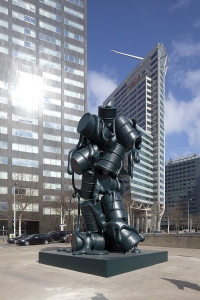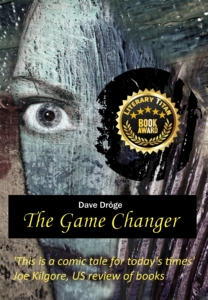The Game Changer

 The Game Changer is a versatile and entertaining novel in which four themes are intertwined.
The Game Changer is a versatile and entertaining novel in which four themes are intertwined.
The style is direct and lively, in accordance with the Rotterdam area prevailing way of live. The novel gives a funny yet rough idea of Rotterdam as a port city and metropolis in the making against a politically charged background: the uprising populism in Europe. This makes the novel timely, probably for the coming years. But it can just as well be considered timeless, in a literary sense. The illustrious company doctor Henk van Wijnen-Swarttouw, a born entrepreneur and flamboyant self-made man, gets in trouble when the justice department accuses him of corruption and tax evasion. At that same moment his daughter Julia begins her sabbatical after high school. Soon, she manages to make a name in the art world, using her devotion for a better, sustainable world as a driving force. She presents her art in the famous Witte de Withstreet. Through her art she is challenging her father to turn his live around. She wants him to restructure his heavy chemical industry business in the port of Rotterdam and the Maasvlakte, one of the biggest harbours in the world, into a sustainable, green company.
There are three interrelated storylines:
- Henk van Wijnen-Swarttouw his business empire is about to collapse.
- Henk his daughter Julia focuses with her heart and soul on her passion: art and sustainability.
- Cor Figee is an employee in one of the subsidiaries of Henk, trying to keep alive within the context in which the novel is set. This also applies to several other characters within the novel.
A brief summary
Julia, just turned eighteen, is allowed by her father to take a year off after ‘cum laude’ obtaining her high school diploma, under strict condition that she will afterwards start her medical study at the Erasmus university. During this sabbatical, she insists that she may use the art gallery of her parents as an exhibition space. She focuses on her passion, creating modern art and raise the issue of sustainability, while her father is trying to save his company, crammed with bad running businesses, from bankruptcy. Within one of these companies Cor Figee operates. He resides with his wife and eleven-year-old son Daan in a working class neighbourhood where different ethnicities live together. The Turkish and mentally disabled neighbour Elenoor frequently comes over to play with Daan. Cor Figee has pinned his hopes on Henk, the new owner of the business, and works day and night to finish a vital deal with the Russians. At the moment Henk should concentrate on saving the family business, he becomes obsessed with Julia her performance art and concern for sustainability, while she becomes embroiled in a complicated affair with the Moroccan named El Bachir. Her best friend, their Romanian housekeeper Tatjana (is that her real name?), tries to survive in her own special way. Then the mother of Julia and Jeroen (her brother in law), as they are afraid of losing the family business, turn to the German Psychiatrist von Stürmer. They want him to cure Henk and his daughter mentally. Will Henk be freed by the psychiatrist from his obsession with Julia? Will his daughter seduce him through her artworks to do something better with the family business then making money only?